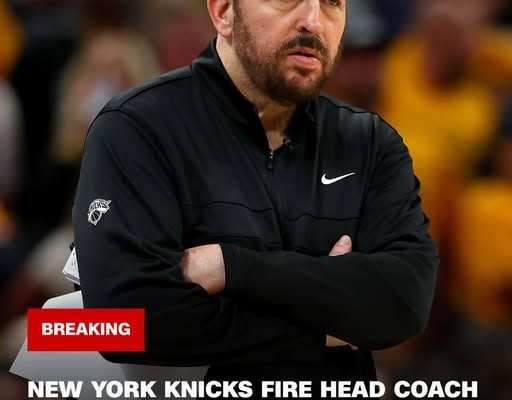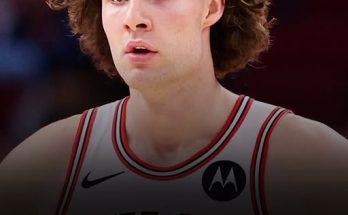The news coming out of Madison Square Garden has sent shockwaves through the basketball world and rekindled a narrative that seems almost cyclical in nature for the New York Knicks. After five tumultuous but occasionally promising seasons, Tom Thibodeau has been relieved of his duties as head coach, just days after the Knicks were bounced out of the NBA playoffs by the Indiana Pacers. For a franchise steeped in both rich tradition and decades of unrealized potential, this move marks another fork in the road—a familiar one, yet wholly unique in its own right. The dismissal of Thibodeau is as much about what was achieved under his watch as it is about what was ultimately left undone.
Thibodeau was brought in ahead of the 2020-2021 season with a reputation that preceded him: a defensive mastermind, a grinder, and a coach who had previously restored relevance to struggling franchises like the Chicago Bulls and, to some extent, the Minnesota Timberwolves. His arrival in New York was met with cautious optimism. The Knicks had been floundering for years, mired in a constant loop of underachievement, front office dysfunction, and lackluster roster construction. Thibodeau offered a lifeline—if not to long-term contention, then at least to respectability and effort.
In his first year with the team, Thibodeau worked what many considered a small miracle. The Knicks went 41-31 during the COVID-shortened season and clinched the 4th seed in the Eastern Conference. Julius Randle emerged as an All-NBA performer, RJ Barrett took encouraging strides, and the team had a clear defensive identity. Thibodeau was named Coach of the Year for the second time in his career, and for the first time in nearly a decade, there was genuine hope emanating from Madison Square Garden. Fans filled the arena with the kind of energy typically reserved for perennial contenders. It felt like the start of something.
But basketball seasons are long and truths have a way of revealing themselves over time. The Knicks’ initial success under Thibodeau was a product of overachievement more than raw talent. The following season, the team regressed sharply. Randle struggled with consistency and Barrett’s development plateaued. Offseason acquisitions failed to live up to expectations, and Thibodeau’s once-admirable rotations began to draw criticism. His tendency to ride starters heavily, limit opportunities for young players, and his general aversion to adaptation became more pronounced. The Knicks finished 37-45, missing the playoffs entirely and reigniting the age-old questions about direction and leadership.
The 2022-2023 season offered a brief reprieve. With the acquisition of Jalen Brunson—an inspired and now widely praised signing—the Knicks found stability at the point guard position, something that had eluded them for years. Brunson was a revelation, providing not just scoring and playmaking but also leadership and poise. The Knicks improved to 47-35 and made a respectable run in the playoffs, eliminating the Cleveland Cavaliers before falling to the Miami Heat in six games. It was a step forward, and Thibodeau, though still polarizing, seemed to have steadied the ship once again.
That playoff performance bought Thibodeau time, but in the NBA, time is a currency that depreciates quickly when wins don’t follow. Expectations for the 2023-2024 season were higher. The team returned its core, Brunson looked ready to ascend to stardom, and the Eastern Conference landscape appeared ripe for disruption. But as the season wore on, cracks began to show. Injuries, inconsistencies, and questionable late-game execution haunted the Knicks. While Brunson continued to shine, Randle remained enigmatic, and the supporting cast failed to provide consistent contributions. Moreover, Thibodeau’s familiar shortcomings resurfaced. His stubbornness in adjusting schemes, reluctance to trust the bench, and his heavy-minute load for starters became recurring points of contention among fans and media alike.
The final blow came in the form of a seven-game loss to the Indiana Pacers in the second round of the playoffs. It wasn’t merely that the Knicks lost, but how they lost. In a series that many felt New York should have won, they appeared unprepared at times, disorganized, and incapable of making timely adjustments. Brunson suffered a fractured hand in Game 7, but even before that unfortunate injury, the writing was on the wall. Tyrese Haliburton picked apart the Knicks’ defense, Indiana’s pace dictated the tempo, and Thibodeau looked increasingly outmatched from the sidelines. The loss was disappointing, but it also laid bare the limitations of this current iteration of the Knicks.
So now, the front office has decided to part ways with the man who helped resuscitate the franchise’s image but couldn’t quite push it to the next level. Thibodeau’s firing isn’t just a reflection of playoff disappointment; it is a philosophical pivot. Team president Leon Rose and executive William Wesley appear ready to explore a new direction, one that presumably involves greater offensive creativity, modern player management, and a willingness to adapt. It’s a decision that invites both risk and opportunity.
There are layers to Thibodeau’s legacy in New York that defy simple classification. On one hand, he brought legitimacy back to the Knicks. He instilled a work ethic, a defensive mindset, and an identity. For a team that had been wandering in the wilderness, that mattered. Fans could once again root for a team that played hard, defended, and took pride in its performance. On the other hand, Thibodeau’s tenure was marked by stubborn patterns—his reliance on veterans, slow in-game adjustments, and a seemingly rigid system that didn’t always maximize the talents of a changing roster.
What complicates matters is that Thibodeau’s players largely respected him. Brunson spoke glowingly about his coach throughout the season, often crediting him with shaping his professional habits. Even younger players like Immanuel Quickley and Quentin Grimes, who occasionally found themselves glued to the bench in key moments, rarely aired grievances publicly. Thibodeau cultivated a locker room that was professional, focused, and bought in—for the most part. But buy-in only goes so far when wins aren’t accumulating, and when the team seems to have hit a ceiling.
This firing also underscores the pressure cooker that is New York basketball. Coaching in the Big Apple is not for the faint of heart. Every move is dissected, every loss magnified. Thibodeau, a New York native, embraced that challenge. He understood the stakes. He knew the city. That made his early success even sweeter, and this ending all the more bittersweet. But the Knicks are in a different place now than when he arrived. This isn’t a franchise merely searching for relevance anymore—it’s a franchise eyeing contention. That requires evolution.
The next hire will be critical. The Knicks must walk a fine line between continuing to build around Brunson and their young core while also keeping an eye on the larger market. With cap flexibility and a treasure trove of draft picks, the organization has tools to make a splash. There has already been speculation about potential successors: names like Kenny Atkinson, James Borrego, and even high-risk, high-reward options like Becky Hammon or a college coach making the NBA leap. Whoever gets the job will inherit a team with talent and expectations, but also a fanbase that has tasted a little success and now wants more.
There is also the question of whether Thibodeau’s firing was a prelude to a larger move. Could the Knicks be positioning themselves to acquire another star? Joel Embiid, Donovan Mitchell, and Karl-Anthony Towns have all been linked to New York in various rumors. Thibodeau’s departure could signal that the front office intends to reshape the roster in a way that requires a different coaching style or system. It’s not uncommon in today’s NBA for coaching changes to be tethered to broader personnel shifts.
Regardless of what comes next, Thibodeau’s impact on the Knicks shouldn’t be dismissed. He took a team many had written off and made them relevant. He brought playoff basketball back to Madison Square Garden, and for that, he’ll always be part of the team’s modern narrative. But as with so many tenures in professional sports, time and results dictate fate. The Knicks believe they’ve seen Thibodeau’s ceiling—and they’re betting there’s a higher one out there.
In the grander scheme, Thibodeau’s firing reflects the ever-evolving nature of coaching in the NBA. Success is fleeting, innovation is necessary, and player-coach relationships are under more scrutiny than ever before. Coaches are expected to be tacticians, motivators, psychologists, and public relations experts all in one. Thibodeau, with his throwback style and laser focus on effort and defense, may have simply fallen out of sync with the league’s evolution. It’s not that his methods are obsolete, but rather that they may no longer be sufficient in isolation.
For the Knicks, the road ahead is filled with promise and peril. The foundation is solid—Brunson is a legitimate star, the team has assets, and the market remains attractive to free agents. But championships aren’t won on paper, and coaching hires aren’t always the panacea they’re imagined to be. The Knicks must get this next move right. They are no longer building from the basement—they’re looking to add the final floors to a house that’s been under construction for decades.
As for Thibodeau, he won’t be out of the league for long. His resume, discipline, and ability to galvanize rosters ensure that he’ll get another opportunity. Whether as a head coach or in a supporting role, his basketball mind still holds value. But for now, his time in New York has reached its end—not with the banner he may have envisioned, but with the dignity of a coach who gave everything he had to a team that, for a while, reflected his relentless spirit.
In a city that demands excellence and rarely offers second chances, Tom Thibodeau’s tenure will be remembered not as a failure, but as an essential chapter in the Knicks’ ongoing quest to reclaim their place among the NBA elite. The next chapter begins now, and once again, all eyes are on Madison Square Garden.



